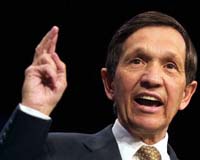 Until recently, the belief that the Republicans cheated their way to victory in the 2004 Presidential was confined to Pacifica Radio and other lefties in the ooby-dooby zone.
Until recently, the belief that the Republicans cheated their way to victory in the 2004 Presidential was confined to Pacifica Radio and other lefties in the ooby-dooby zone.Now the Rolling Stone has published a piece by Robert Kennedy Jr.
 retailing the same accusations, a piece that has apparently impressed some, such as the Good Inger.
retailing the same accusations, a piece that has apparently impressed some, such as the Good Inger.The charges have also been debunked by such an unlikely source as NPR:
There also was a session called, "Who Really Won the Election 2004?" This was an opportunity for the cyber-active bloggers who think the Ohio vote was somehow fraudulent to present their best case. They didn't. Their presentations were confusing, if not incoherent to this listener, and they all seemed to boil down to one complaint: namely, that the vote totals didn't match the exit polls. The problem with that argument is that if you can give good reasons why the exit polls were wrong in Ohio (and there are many), their entire complaint disappears.Salon also delivered a thorough Fisking to these charges. (HT: TigerHawk.)
I have to say, though, that I did see the respondent in that panel, who gave a thoughtful and coherent critique of the vote-fraud proponents, chatting for hours one evening with one of the presenters. It's the good thing about a conference like this, even when it rains.
The Salon piece is pretty fierce:
If you do read Kennedy's article, be prepared to machete your way through numerous errors of interpretation and his deliberate omission of key bits of data. The first salient omission comes in paragraph 5, when Kennedy writes, "In what may be the single most astounding fact from the election, one in every four Ohio citizens who registered to vote in 2004 showed up at the polls only to discover that they were not listed on the rolls, thanks to GOP efforts to stem the unprecedented flood of Democrats eager to cast ballots." To back up that assertion, Kennedy cites "Democracy at Risk," the report the Democrats released last June.No one is under an obligation to love W., or support his policies. My decision to vote for him was motivated by my contempt for that stick-up-his-ass French-looking Senator from Massachusetts and the left wing of his party. Better 100 James Dobsons than one Dennis Kucinich!
That report does indeed point out that many people -- 26 percent -- who first registered in 2004 did not find their names on the voter rolls at polling places. What Kennedy doesn't say, though, is that the same study found no significant difference in the share of Kerry voters and Bush voters who came to the polls and didn't find their names listed. The Democrats' report says that 4.2 percent of Kerry voters were forced to cast a "provisional" ballot and that 4.1 percent of Bush voters were made to do the same -- a stat that lowers the heat on Kennedy's claim of "astounding" partisanship.
Such techniques are evident throughout Kennedy's article. He presents a barrage of seemingly important, apparently damning data to show that Kerry won the race. It's only when you dig into his claims that you see what thin ice he's on.
 |  |
Let us assume for a moment that Bobby Kennedy was a great man. If so, Robert Jr. proves that "regression toward the mean" applies to political leadership as to stature, test-taking, and baseball.

No comments:
Post a Comment